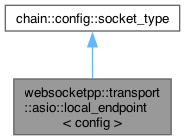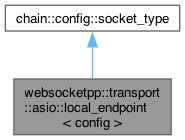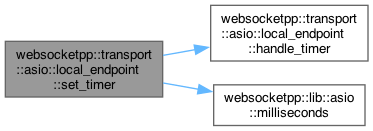Asio based endpoint transport component. More...
#include <local_endpoint.hpp>


Public Types | |
| typedef local_endpoint< config > | type |
| Type of this endpoint transport component. | |
| typedef config::concurrency_type | concurrency_type |
| Type of the concurrency policy. | |
| typedef config::socket_type | socket_type |
| Type of the socket policy. | |
| typedef config::elog_type | elog_type |
| Type of the error logging policy. | |
| typedef config::alog_type | alog_type |
| Type of the access logging policy. | |
| typedef socket_type::socket_con_type | socket_con_type |
| Type of the socket connection component. | |
| typedef socket_con_type::ptr | socket_con_ptr |
| Type of a shared pointer to the socket connection component. | |
| typedef asio::connection< config > | transport_con_type |
| typedef transport_con_type::ptr | transport_con_ptr |
| typedef lib::asio::io_service * | io_service_ptr |
| Type of a pointer to the ASIO io_service being used. | |
| typedef lib::shared_ptr< lib::asio::local::stream_protocol::acceptor > | acceptor_ptr |
| Type of a shared pointer to the acceptor being used. | |
| typedef lib::shared_ptr< lib::asio::steady_timer > | timer_ptr |
| Type of timer handle. | |
| typedef lib::shared_ptr< lib::asio::io_service::work > | work_ptr |
| Type of a shared pointer to an io_service work object. | |
Public Member Functions | |
| local_endpoint () | |
| ~local_endpoint () | |
| bool | is_secure () const |
| Return whether or not the endpoint produces secure connections. | |
| void | init_asio (io_service_ptr ptr, lib::error_code &ec) |
| initialize asio transport with external io_service (exception free) | |
| void | init_asio (io_service_ptr ptr) |
| initialize asio transport with external io_service | |
| void | set_tcp_pre_init_handler (tcp_init_handler h) |
| Sets the tcp pre init handler. | |
| void | set_tcp_init_handler (tcp_init_handler h) |
| Sets the tcp pre init handler (deprecated) | |
| void | set_tcp_post_init_handler (tcp_init_handler h) |
| Sets the tcp post init handler. | |
| lib::asio::io_service & | get_io_service () |
| Retrieve a reference to the endpoint's io_service. | |
| void | listen (lib::asio::local::stream_protocol::endpoint const &ep, lib::error_code &ec) |
| Set up endpoint for listening manually (exception free) | |
| void | listen (lib::asio::local::stream_protocol::endpoint const &ep) |
| Set up endpoint for listening manually. | |
| void | stop_listening (lib::error_code &ec) |
| Stop listening (exception free) | |
| void | stop_listening () |
| Stop listening. | |
| bool | is_listening () const |
| Check if the endpoint is listening. | |
| std::size_t | run () |
| wraps the run method of the internal io_service object | |
| std::size_t | run_one () |
| wraps the run_one method of the internal io_service object | |
| void | stop () |
| wraps the stop method of the internal io_service object | |
| std::size_t | poll () |
| wraps the poll method of the internal io_service object | |
| std::size_t | poll_one () |
| wraps the poll_one method of the internal io_service object | |
| void | reset () |
| wraps the reset method of the internal io_service object | |
| bool | stopped () const |
| wraps the stopped method of the internal io_service object | |
| void | start_perpetual () |
| Marks the endpoint as perpetual, stopping it from exiting when empty. | |
| void | stop_perpetual () |
| Clears the endpoint's perpetual flag, allowing it to exit when empty. | |
| timer_ptr | set_timer (long duration, timer_handler callback) |
| Call back a function after a period of time. | |
| void | handle_timer (timer_ptr, timer_handler callback, lib::asio::error_code const &ec) |
| Timer handler. | |
| void | async_accept (transport_con_ptr tcon, accept_handler callback, lib::error_code &ec) |
| Accept the next connection attempt and assign it to con (exception free) | |
| void | async_accept (transport_con_ptr tcon, accept_handler callback) |
| Accept the next connection attempt and assign it to con. | |
Protected Member Functions | |
| void | init_logging (alog_type *a, elog_type *e) |
| Initialize logging. | |
| void | handle_accept (accept_handler callback, lib::asio::error_code const &asio_ec) |
| void | handle_connect_timeout (transport_con_ptr tcon, timer_ptr, connect_handler callback, lib::error_code const &ec) |
| Asio connect timeout handler. | |
| void | handle_connect (transport_con_ptr tcon, timer_ptr con_timer, connect_handler callback, lib::asio::error_code const &ec) |
| lib::error_code | init (transport_con_ptr tcon) |
| Initialize a connection. | |
Detailed Description
class websocketpp::transport::asio::local_endpoint< config >
transport::asio::endpoint implements an endpoint transport component using Asio.
Definition at line 159 of file local_endpoint.hpp.
Member Typedef Documentation
◆ acceptor_ptr
| lib::shared_ptr<lib::asio::local::stream_protocol::acceptor> websocketpp::transport::asio::local_endpoint< config >::acceptor_ptr |
Definition at line 188 of file local_endpoint.hpp.
◆ alog_type
| config::alog_type websocketpp::transport::asio::local_endpoint< config >::alog_type |
Definition at line 171 of file local_endpoint.hpp.
◆ concurrency_type
| config::concurrency_type websocketpp::transport::asio::local_endpoint< config >::concurrency_type |
Definition at line 165 of file local_endpoint.hpp.
◆ elog_type
| config::elog_type websocketpp::transport::asio::local_endpoint< config >::elog_type |
Definition at line 169 of file local_endpoint.hpp.
◆ io_service_ptr
| lib::asio::io_service* websocketpp::transport::asio::local_endpoint< config >::io_service_ptr |
Definition at line 186 of file local_endpoint.hpp.
◆ socket_con_ptr
| socket_con_type::ptr websocketpp::transport::asio::local_endpoint< config >::socket_con_ptr |
Definition at line 176 of file local_endpoint.hpp.
◆ socket_con_type
| socket_type::socket_con_type websocketpp::transport::asio::local_endpoint< config >::socket_con_type |
Definition at line 174 of file local_endpoint.hpp.
◆ socket_type
| config::socket_type websocketpp::transport::asio::local_endpoint< config >::socket_type |
Definition at line 167 of file local_endpoint.hpp.
◆ timer_ptr
| lib::shared_ptr<lib::asio::steady_timer> websocketpp::transport::asio::local_endpoint< config >::timer_ptr |
Definition at line 190 of file local_endpoint.hpp.
◆ transport_con_ptr
| transport_con_type::ptr websocketpp::transport::asio::local_endpoint< config >::transport_con_ptr |
Type of a shared pointer to the connection transport component associated with this endpoint transport component
Definition at line 183 of file local_endpoint.hpp.
◆ transport_con_type
| asio::connection<config> websocketpp::transport::asio::local_endpoint< config >::transport_con_type |
Type of the connection transport component associated with this endpoint transport component
Definition at line 180 of file local_endpoint.hpp.
◆ type
| local_endpoint<config> websocketpp::transport::asio::local_endpoint< config >::type |
Definition at line 162 of file local_endpoint.hpp.
◆ work_ptr
| lib::shared_ptr<lib::asio::io_service::work> websocketpp::transport::asio::local_endpoint< config >::work_ptr |
Definition at line 192 of file local_endpoint.hpp.
Constructor & Destructor Documentation
◆ local_endpoint()
|
inlineexplicit |
Definition at line 195 of file local_endpoint.hpp.
◆ ~local_endpoint()
|
inline |
Definition at line 202 of file local_endpoint.hpp.
Member Function Documentation
◆ async_accept() [1/2]
|
inline |
- Parameters
-
tcon The connection to accept into. callback The function to call when the operation is complete.
Definition at line 630 of file local_endpoint.hpp.

◆ async_accept() [2/2]
|
inline |
- Parameters
-
tcon The connection to accept into. callback The function to call when the operation is complete. ec A status code indicating an error, if any.
Definition at line 591 of file local_endpoint.hpp.


◆ get_io_service()
|
inline |
The io_service may be an internal or external one. This may be used to call methods of the io_service that are not explicitly wrapped by the endpoint.
This method is only valid after the endpoint has been initialized with init_asio. No error will be returned if it isn't.
- Returns
- A reference to the endpoint's io_service
Definition at line 342 of file local_endpoint.hpp.

◆ handle_accept()
|
inlineprotected |
Definition at line 651 of file local_endpoint.hpp.

◆ handle_connect()
|
inlineprotected |
Definition at line 703 of file local_endpoint.hpp.

◆ handle_connect_timeout()
|
inlineprotected |
The timer pointer is included to ensure the timer isn't destroyed until after it has expired.
- Parameters
-
tcon Pointer to the transport connection that is being connected con_timer Pointer to the timer in question callback The function to call back ec A status code indicating an error, if any.
Definition at line 680 of file local_endpoint.hpp.
◆ handle_timer()
|
inline |
The timer pointer is included to ensure the timer isn't destroyed until after it has expired.
- Parameters
-
t Pointer to the timer in question callback The function to call back ec A status code indicating an error, if any.
Definition at line 568 of file local_endpoint.hpp.

◆ init()
|
inlineprotected |
init is called by an endpoint once for each newly created connection. It's purpose is to give the transport policy the chance to perform any transport specific initialization that couldn't be done via the default constructor.
- Parameters
-
tcon A pointer to the transport portion of the connection.
- Returns
- A status code indicating the success or failure of the operation
Definition at line 740 of file local_endpoint.hpp.
◆ init_asio() [1/2]
|
inline |
Initialize the ASIO transport policy for this endpoint using the provided io_service object. asio_init must be called exactly once on any endpoint that uses transport::asio before it can be used.
- Parameters
-
ptr A pointer to the io_service to use for asio events
Definition at line 282 of file local_endpoint.hpp.

◆ init_asio() [2/2]
|
inline |
Initialize the ASIO transport policy for this endpoint using the provided io_service object. asio_init must be called exactly once on any endpoint that uses transport::asio before it can be used.
- Parameters
-
ptr A pointer to the io_service to use for asio events ec Set to indicate what error occurred, if any.
Definition at line 256 of file local_endpoint.hpp.


◆ init_logging()
|
inlineprotected |
The loggers are located in the main endpoint class. As such, the transport doesn't have direct access to them. This method is called by the endpoint constructor to allow shared logging from the transport component. These are raw pointers to member variables of the endpoint. In particular, they cannot be used in the transport constructor as they haven't been constructed yet, and cannot be used in the transport destructor as they will have been destroyed by then.
Definition at line 646 of file local_endpoint.hpp.
◆ is_listening()
|
inline |
- Returns
- Whether or not the endpoint is listening.
Definition at line 456 of file local_endpoint.hpp.
◆ is_secure()
|
inline |
Definition at line 243 of file local_endpoint.hpp.
◆ listen() [1/2]
|
inline |
Bind the internal acceptor using the settings specified by the endpoint e
- Parameters
-
ep An endpoint to read settings from
Definition at line 410 of file local_endpoint.hpp.

◆ listen() [2/2]
|
inline |
Bind the internal acceptor using the specified settings. The endpoint must have been initialized by calling init_asio before listening.
- Parameters
-
ep An endpoint to read settings from ec Set to indicate what error occurred, if any.
Definition at line 354 of file local_endpoint.hpp.


◆ poll()
|
inline |
Definition at line 479 of file local_endpoint.hpp.
◆ poll_one()
|
inline |
Definition at line 484 of file local_endpoint.hpp.
◆ reset()
|
inline |
Definition at line 489 of file local_endpoint.hpp.
◆ run()
|
inline |
Definition at line 461 of file local_endpoint.hpp.
◆ run_one()
|
inline |
- Since
- 0.3.0-alpha4
Definition at line 469 of file local_endpoint.hpp.
◆ set_tcp_init_handler()
|
inline |
The tcp pre init handler is called after the raw tcp connection has been established but before any additional wrappers (proxy connects, TLS handshakes, etc) have been performed.
- Deprecated
- Use set_tcp_pre_init_handler instead
- Parameters
-
h The handler to call on tcp pre init.
Definition at line 312 of file local_endpoint.hpp.

◆ set_tcp_post_init_handler()
|
inline |
The tcp post init handler is called after the tcp connection has been established and all additional wrappers (proxy connects, TLS handshakes, etc have been performed. This is fired before any bytes are read or any WebSocket specific handshake logic has been performed.
- Since
- 0.3.0
- Parameters
-
h The handler to call on tcp post init.
Definition at line 327 of file local_endpoint.hpp.
◆ set_tcp_pre_init_handler()
|
inline |
The tcp pre init handler is called after the raw tcp connection has been established but before any additional wrappers (proxy connects, TLS handshakes, etc) have been performed.
- Since
- 0.3.0
- Parameters
-
h The handler to call on tcp pre init.
Definition at line 298 of file local_endpoint.hpp.

◆ set_timer()
|
inline |
Sets a timer that calls back a function after the specified period of milliseconds. Returns a handle that can be used to cancel the timer. A cancelled timer will return the error code error::operation_aborted A timer that expired will return no error.
- Parameters
-
duration Length of time to wait in milliseconds callback The function to call back when the timer has expired
- Returns
- A handle that can be used to cancel the timer if it is no longer needed.
Definition at line 540 of file local_endpoint.hpp.

◆ start_perpetual()
|
inline |
Marks the endpoint as perpetual. Perpetual endpoints will not automatically exit when they run out of connections to process. To stop a perpetual endpoint call end_perpetual.
An endpoint may be marked perpetual at any time by any thread. It must be called either before the endpoint has run out of work or before it was started
- Since
- 0.3.0
Definition at line 510 of file local_endpoint.hpp.
◆ stop()
|
inline |
Definition at line 474 of file local_endpoint.hpp.
◆ stop_listening() [1/2]
|
inline |
Stop listening and accepting new connections. This will not end any existing connections.
- Since
- 0.3.0-alpha4
Definition at line 446 of file local_endpoint.hpp.


◆ stop_listening() [2/2]
|
inline |
Stop listening and accepting new connections. This will not end any existing connections.
- Since
- 0.3.0-alpha4
- Parameters
-
ec A status code indicating an error, if any.
Definition at line 424 of file local_endpoint.hpp.

◆ stop_perpetual()
|
inline |
Clears the endpoint's perpetual flag. This will cause the endpoint's run method to exit normally when it runs out of connections. If there are currently active connections it will not end until they are complete.
- Since
- 0.3.0
Definition at line 524 of file local_endpoint.hpp.
◆ stopped()
|
inline |
Definition at line 494 of file local_endpoint.hpp.
The documentation for this class was generated from the following file:
- plugins/http_plugin/include/sysio/http_plugin/local_endpoint.hpp